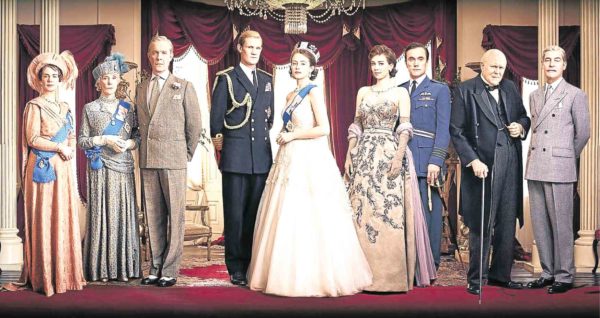Claire Foy, Matt Smith talk about loving and leaving ‘The Crown’

From left: Victoria Hamilton, Eileen Atkins, Alex Jennings, Matt Smith, Claire Foy, Vanessa Kirby, Ben Miles, John Lithgow and Jeremy Northam in “The Crown”
LONDON—It isn’t every day that you can say you’ve been to London to visit the queen. But, that’s exactly what we did on our recent trip to the United Kingdom—when we were granted an “audience” with the dazzling Claire Foy and her dashing screen consort, Matt Smith.
Claire and Matt, who portray Queen Elizabeth II and her husband Prince Philip, Duke of Edinburgh in the Golden Globe-nominated series “The Crown,” were as emotionally expressive as they were deeply appreciative of the high praise that their show has been reaping since its November debut last year.
The Netflix series’ second season only began streaming last Dec. 8, but its attractive lead stars were already starting to feel the pinch and punch of withdrawal pangs as they began waxing nostalgic about the show, which will field new actors to portray the “maturing” royal couple in “The Crown’s” succeeding seasons. Needless to say, whoever they will be will have very big shoes to fill.
When asked what they’ll miss the most about the series, Claire glanced at her screen partner and winkingly quipped, “Matt, of course!—Sadly, it has come to this.”
Matt quickly retorted: “I will miss Claire…and eating beside her (laughs). It’s the end of the road for both of us. But, extraordinary new people will come in and take over. We’ll be fish food by then (laughs).” “Yes, we’re just a flash in the pan,” Claire responded with a chuckle.
Article continues after this advertisementThe conspiratorial and easygoing banter between the actors provided a refreshing change of pace for the duo who portrays a royal couple who has difficulty communicating with each other.
Article continues after this advertisementAs we chatted over muffins and cups of tea in a room at the Corinthia, it was easy to see how fond they were of each other.
Excerpts from our quick Q&A:
What did you think of the queen and her husband’s problematic relationship in the latest season?
Claire (C): That’s the problem—they don’t talk about their problems. The first season papered over the cracks in their relationship.
In Season 2, the wheels come off. But, they haven’t really been communicating.
Matt (M): So, it’s about people dealing with that complication, with varying results and success rates. We shine a light on that and explore their frailties—and that’s what makes this compelling.
Queen Elizabeth II and Prince Philip just celebrated their 70th anniversary. After two seasons, do you feel you know them better than other people?
C: I don’t think it’s possible for anybody to truly know what they’re actually going through.
M: But, we’ve come to understand them more. There’s increased appreciation for them from our perspective.
In the show, the prince’s infidelity is merely suggested. Why does the show choose to be unclear about it?
M: That’s more a question for (writer-showrunner) Peter Morgan, who constructed the show’s dramatic shape. These things are out there in the ether, but we don’t want to be salacious or gratuitous with the details. It’s about interpretation, so we leave that up to the audience to decide what extent he has or has not committed adultery.
C: It would have been odd if Peter decided to leave that “detail” out. But, he’s done it very delicately. So, it depends on whose point of view you’re viewing it from. You don’t know what we’re thinking, because we never tell you. Figuring that out makes it compelling.
Were you ever concerned about offending the royal family?
Both: No.
Is it harder to portray real-life characters than fictional ones?
C: I realized very early on that I wasn’t portraying the “Queen of England”—I was playing a woman called Elizabeth Mountbatten, who’s pretending to be queen. The “Queen” is a construct and a mystery; she doesn’t exist. The monarchy is an institution and a symbol that exist even without her. (She pauses.) —Uh, I just blabbered about something that’s completely incomprehensible, didn’t I (laughs)?
M: I’m actually intrigued!
C: You can be a queen or a prince, but [becoming one] does not necessarily make it who you are. It’s trickier to interpret something from a book, because you’ll be going against people’s perception and different interpretations of it.
Did you study how your characters look, walk or talk?
C: Yes, otherwise they’d be like us.
M: You try to learn their behavior, temperament, and how they react to situations. You try to “understand” them physically and emotionally, then you add all these things together and reinterpret them in the context of the “fictionalized” story you’re telling.
What does the show mean to you?
M: It’s incredible. I think we can look back and acknowledge that it’s been a huge moment in our lives. It makes me reflect on myself and my country.
C: It’s been an amazing two years. It’s very rare for any actor to be involved in something that people appreciate and genuinely care about. “The Crown” has shown me how a show can change people’s perception about its subject matter and what drama can do.
What was the most romantic moment in the show for you?
M: Every day on the set was romantic (laughs). There was a scene in Africa where we were leaning by a tree and kissing, but it didn’t make the final cut.
C: All the scenes that we did were the most romantic moments in my life—like the sequence where we were watching the elephants in Africa.
M: And Claire is terribly convincing at looking as if she were truly in love with me (laughs).